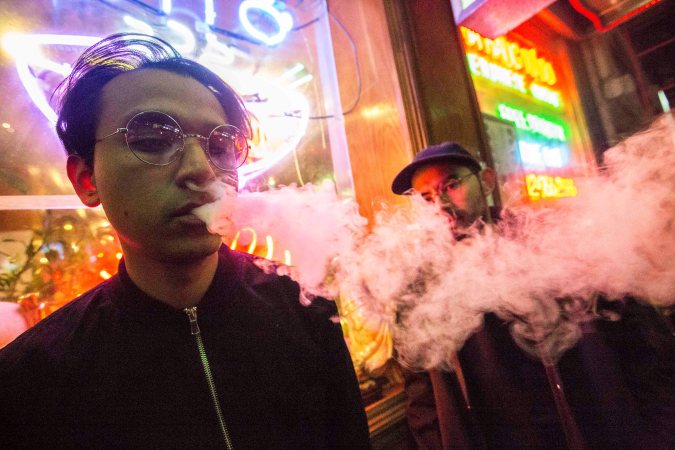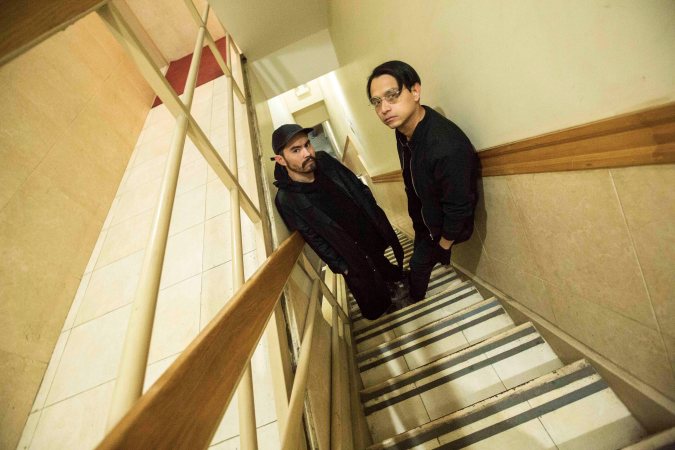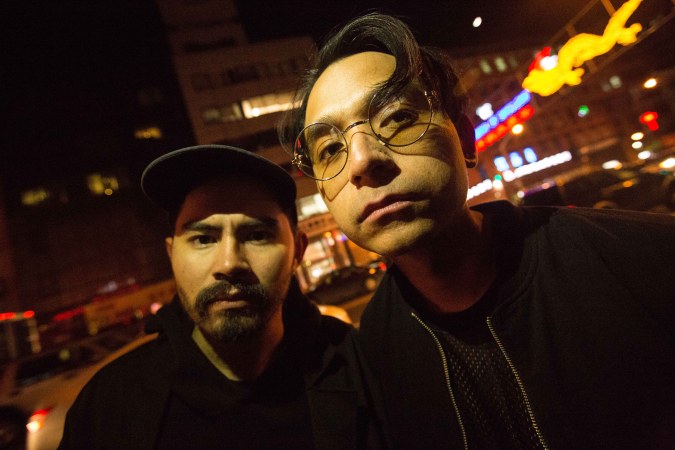When a generation’s essential voice of sociopolitical dissent vanishes, the absence is glaring. Such was the case with Los Macuanos, who, after four long years of silence, have resurfaced with their new album Epílogo, an introspective synthesis of the band’s trials and tribulations as burnt-out rock stars and despondent witnesses to a decaying Mexican nation.
Moisés López and Moisés Horta founded Los Macuanos in Tijuana in early 2009, in the throes of the Mexican drug war that thrust the fast-paced border city into one of its bloodiest periods. With tragic inspiration hanging over them, the two began jamming and musically processing their anxieties in Horta’s apartment. “We wanted to make something that sounded of the region,” reveals López in an interview with Remezcla. “Tijuana, San Diego, Chulavista; that’s where we’re all from. We listened to a lot of European electronic music and American indie at the time, but that regional feel was always in the back our minds when we were producing.”

“We were throwing lots of parties back then,” chimes in Reuben Torres, who joined the band a few months after the original lineup formed. “That’s how it all began. We didn’t just want to start a band; we wanted to start our own scene!” With a chuckle, he adds, “We had delusions of grandeur.”
Ruidosón captures the ongoing struggle of Mexican-Americans living in border purgatory.
Heriberto Yépez’s seminal book La Increíble Hazaña De Ser Mexicano stands as one of the pillars of the band’s musical philosophy. Los Macuanos view the cultural landscape through the lens of the “retro mexicano,” a concept coined by Yépez as an indictment of Mexico’s modern affinity for recycling its own culture to exploit and capitalize nostalgia. By electrifying cumbia, tribal, and norteño as mediums for their criticism, Los Macuanos helped pioneer ruidosón, a genre that turns the folksy conceit of these traditional rhythms on the institutions that hold them so dear. Urgent and eclectic, ruidosón also captures the ongoing struggle of Mexican-Americans living in border purgatory, straddling two worlds where they are often made to feel unworthy of either.
With a string of parties in play, a growing list of followers and collaborators, and a strong mission statement, Los Macuanos soon found themselves in the thick of the exciting new scene they had yearned for. According to Torres, the band’s first mix “Ruidosón Pa La Pasión” and María y José’s Espíritu Invisible laid the blueprint for ruidosón.”
All these years later, the band’s sound is nearly unrecognizable. Not only have Los Macuanos filed down the more jagged edges of their sound, the band is now characterized by its dark, heavy, and pessimistic energy. Even their first two albums, El Fin (2010) and El Origen (2013), which established them as Latin goth powerhouses, maintained a certain amount of levity despite their regularly cutting political themes. Epílogo, the trio’s latest effort, is a contiguous 33-minute album that is doubtless the blackest point in their creative tunnel. Recorded between 2012 and 2016, an anxious feral aura surrounds Epílogo, capturing the anger and despondence of living in Enrique Peña Nieto’s Mexico, as well as the band’s descent into Mexico City excess.

“This album totally reflects how I felt while we were living in CDMX,” offers Moisés Lopez. “Being away from home, away from everyone I knew, it was very lonely.” On the sound of the album he adds, “At some point Los Macuanos made a turn into minor key-type music, more subdued and introspective, which continued into Epílogo. This is the album where I feel I got it right. It evokes the feelings I wanted to convey. It’s a downer album, very depressive, but I think it has a good balance of party music and ambient sounds.” He’s not kidding. The tone of the record is immediately set by opener “Tierra Baldía,” an eerie incantation laid over a skeletal house beat. “Los Miedos” follows as a deeper, glitchier exploration of the former, using voiceovers of angry, distressed people to truly ignite the fuse of despair.
Los Macuanos’ familiar social incisiveness first emerges on “Los de Arriba,” where a ghostly voice recites the names and net worth of various Mexican billionaires. The song ends with distraught cries of “asesino!” that lead into track “1DMX,” which cultivates our anxiety before transmuting it to anger on “Soldado Sin Cara.” As the album’s lead single, “Soldado Sin Cara” is a blistering commentary on Mexico’s police state, but within the album, the song takes a deeper dimension, harkening back to tender social wounds of income inequality, the Ayotzinapa disappearances, and shameful government subservience towards foreign imperialism. “El Fin and El Origen reference the period in Mexico when Calderon started the drug war,” says Torres. “Epílogo is of the EPN era.”

Considering the current wave of social unrest, it’s easy to view Epílogo as a one-size-fits-all political record, but the band is adamant it should not be taken as such. “We were broke, starving, partied out, deep in relationship troubles, and I lost a ton of weight,” recalls Torres about the band’s time living in Mexico City. “So a lot of that dark energy wasn’t necessarily an effort to make things political, but that anxiety coincided with dark times for the country.” He adds, “I remember listening to ‘Ruidosón Pa La Pasión’ and how happy and jovial it was, which is nothing like how the band sounds now, and asking Moi [López], ‘How did it all turn so dark so quickly?’”
An anxious feral aura surrounds Epílogo, capturing the despondence of living in Enrique Peña Nieto’s Mexico.
Despite its bleak otherworldliness, the band is quick to note Epílogo belongs in the ruidosón canon. If you squint and listen carefully, you can hear a deconstructed tribal beat at the core of “Soldado Sin Cara,” as well as some cumbia playfulness on “El Precipicio.” Torres maintains the album references “that very Latin, very Mexican rhythm” of the band’s early days, and López takes it one step further by suggesting they’ve actually gone back to their ruidosón roots by “re-incorporating ruido, noise, dissonance into the more traditional Latin party music.”
The genre they helped conceive has evolved beyond recognition since the days of boozing in Moisés Horta’s living room and throwing clandestine house parties around Tijuana. Siete Catorce, who started his career under the wing of Los Macuanos, spent a brief stint on the NAAFI roster and has gone on to perform at parties and festivals throughout Mexico. Santos, whom Torres refers to as the last standard bearer of classic ruidosón, took his ferocious dance music to the latest edition of Festival NRMAL. On the other hand, María y José’s Tony Gallardo retired his balaclava-wearing persona to focus on his numerous side projects. To top it all off, Alfredo Gonzalez Reynoso is currently writing and developing a book called Nación Ruidosón, a definite chronicle of the movement.

But the biggest change has come in the form of Moisés Horta’s departure from Los Macuanos. Instead of portraying it as a messy public split, López and Torres have embraced the band’s new direction, relishing the possibilities the shake-up has to offer. The changes are not just physical, but thematic as well, with both remaining members agreeing they are no longer enamored or morbidly obsessed with documenting and reacting to the minutiae of Mexican culture. As López muses, “I feel like Epílogo is wrapping up that whole story line. I’m not in that situation anymore…well, it’s all different. TJ is nowhere near as dark as it used to be. It’s all gentrified now,” he laughs.
Epílogo’s doom and gloom made way for healing within the band, an important lesson to heed as the world becomes an increasingly turbulent place. Catharsis from the band’s exploration of their political and personal worries makes Epílogo a current and deeply relatable – if harrowing – listening experience. Though Los Macuanos are already at work on new material, hinting at sunnier days ahead, Epílogo will remain the final chapter and afterword in their trilogy of darkness, a reminder even the blackest night is eventually broken by the light of dawn.
Los Macuanos’ Epílogo is out now via Nacional Records.
Editor’s note: Reuben Torres is a Remezcla contributor.




